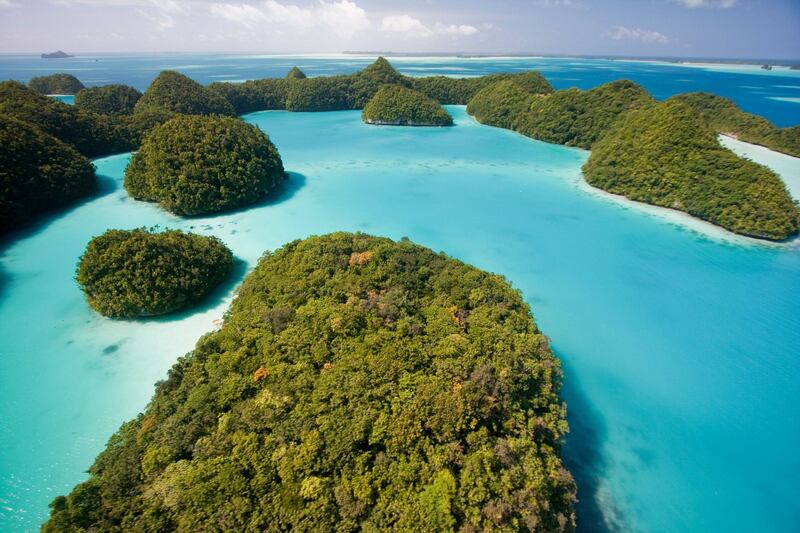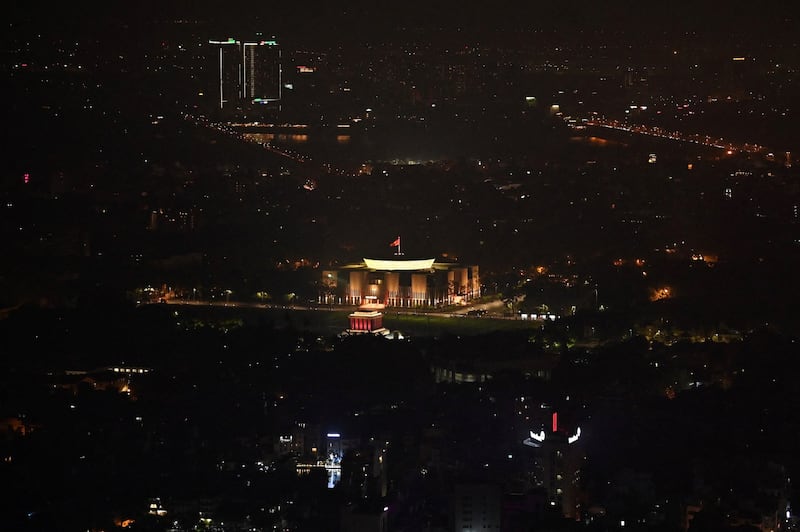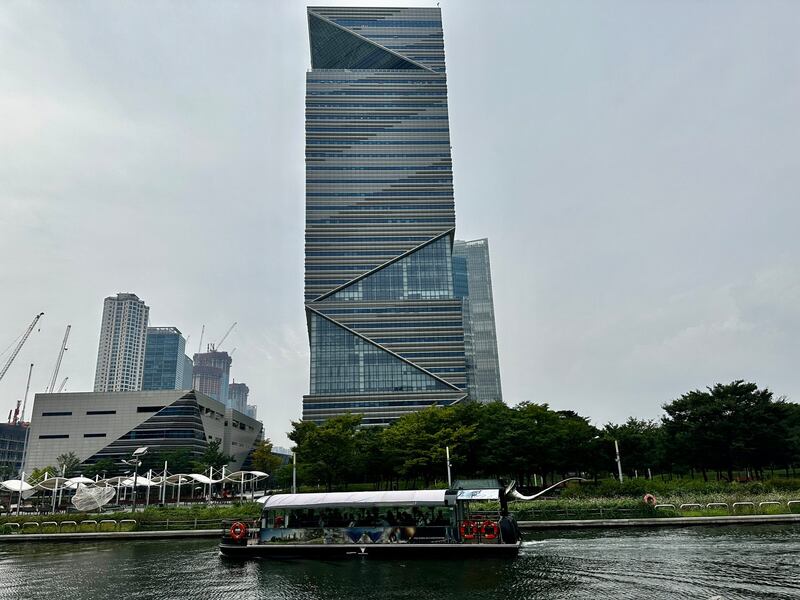The global climate adaptation week in South Korea ended not with a bang, but a whimper.
September’s Incheon City event was intended to unite Asia-Pacific leaders on climate change but faced several issues, including visa troubles for some speakers.
Despite key figures missing, attendees from Bangladesh to Vanuatu discussed the challenge in accessing climate finance.
To tackle climate change requires investing hundreds of billions of dollars, especially for hard-hit developing nations, who say industrialized countries that historically benefited from greenhouse gas emissions should pay.
This is primarily done through significant climate finance mechanisms, such as the Green Climate Fund (GCF), to ensure accessible, sustainable, and cost-effective aid.
However, many countries say such funds are tough to access due to their complex and resource-consuming processes. Even GFC itself conceded in an internal review that the convoluted process puts its reputation at stake.
“Despite the ever-increasing volumes, process improvements and increasing quality, partners continue to perceive the project appraisal and approval cycle as bureaucratic, lengthy, inconsistent and non-transparent,” the review said.
Operational since 2015, the U.N.-backed GCF is the world’s most prominent climate fund – with US$18 billion in capital currently – to fund climate adaptation and mitigation projects.
Housed inside the iconic G-Tower in Incheon City’s wealthy neighborhood of Songdo, GCF has disbursed $3.7 billion so far. However, it has approved projects worth $12.8 billion, with less than a third in 83 Asia-Pacific projects.
On Thursday, GCF is set to hold its second pledging conference in Bonn, Germany, asking rich countries to prove their climate commitments and raise funds for the next four years to disburse $50 billion by 2030.
Climate frontline countries feel cash pain
In his lifetime, Palau’s President Surangel Whipps Jr. says he has seen the top of docks that were never covered with seawater now regularly submerged.
“One particular island I visited in 1980 and went back in 2020 shrunk in size by two-thirds,” he told Radio Free Asia earlier this year, adding the sea turtles laying eggs on the beach would not now survive.
Eight of the 10 inhabited islands risk submersion. Palau’s stingless jellyfish disappeared last year due to extreme heat. Rising sea temperatures could deplete 40% of the tuna stock by 2050.
However, the access to climate financing to tackle these issues “has just been difficult - almost impossible,” the president said.
The Pacific Island country received a $9 million project approval only in July after more than two-and-a-half years of waiting.

Seve Paeniu, Tuvalu’s finance minister, shared a similar experience.
“We first tried to access the Green Climate Fund six to seven years ago. It took us two to three years from conceiving the idea to GCF approving the funding,” Paeniu said at a May event in Bangkok.
“And then it took us another four or five years to reach implementation, and we just started the civil works for the coastal adaptation program in the last several months.”
Experts believe GCF's accreditation and approval processes are biased against smaller or developing nations, as they often cannot meet the strict financial standards and usually suggest smaller projects incompatible with high transaction costs.
Neang Vanny from Cambodia's climate change and development department mentioned it took three years for Phnom Penh to draft a $36 million grant application, and another four years for approval.
Laksmi Dhewanthi, head of Indonesia’s climate change department, noted Jakarta secured GCF funding in October 2021 after a three-year process.
Country needs, fund priorities are different
According to the country’s action plan, Vietnam needs some $20 billion to tackle climate change.
“There is a tremendous gap between what we need, what is required, and what is available in financing at the moment,” said Lan Thanh Ha, an official at Vietnam’s agriculture and rural development ministry.
He said most funding comes for mitigation. “There’s still high demand for adaptation projects … we do have difficulties in assessing those funding sources.”
Mitigation reduces greenhouse gas emissions, like using solar power, while adaptation adjusts to climate changes, such as building coastal sea walls.
According to GCF, the proportion of approved adaptation finance was much less compared to mitigation, at 17% to 50%. The rest was cross-cutting, both adaptation and mitigation.

A climate expert criticized GCF and similar funds for making the procedure “very, very complicated.”
“You need an expert, a Ph.D. consultant in the subject of writing such proposals, to be able to write,” said Saleemul Huq, a lead author of the U.N.-backed IPCC climate reports.
“It takes ages for the proposals to be approved, as they come back with many questions, and you answer those questions and they come back with more questions. It takes years before a project gets approved.”
At the last board meeting, Bangladesh had two projects approved. “One took seven years and hundreds of questions to be approved,” Huq said.
Many countries have “bitter” experiences because they make “a lot of effort for tiny outcomes, and many of them are just giving up,” he added.
Huq said that while renewable energy projects earn money and can repay loans, adaptation doesn’t generate income.
GCF’s April report said more than 50% of the allocated funding was in the form of loans and equity, while the use of grants has decreased from 53% in 2017 to 37% last year.
Cook Islands Prime Minister Mark Brown said small countries need financing “in the form of grant funding” since they have limited revenue.
“It’s quite insulting that we’re being asked to borrow money from the major polluters of the environment to protect ourselves against the impacts,” he told RFA. “I think that’s morally wrong.”
An environmentalist at the Songdo conference likened climate financing to “borrowing a friend’s car, breaking it, and then asking the friend to borrow money from you to fix it if they’re creditworthy.”
Sitting in Songdo, deciding on Suva
At a recent Asia-Pacific dialogue hosted by GCF in South Korea, a participant from a Pacific Island questioned why GCF requires 30 years of climate data for project ideas, given the IPCC’s urgent warnings about their existential threat.
“They sit here in Songdo and make rules on how any country can apply for funding. And the rules are extremely complicated,” Huq said. “Only big countries can do that with a lot of capacity.”
Sindra Sharma of the Pacific Island Climate Action Network highlighted that due to intricate funding structures, nations are increasingly seeking climate support from China and to some extent, India. China's swift financing, while beneficial for prompt action in smaller states, might make tracking and accountability challenging outside the established climate finance framework.
Separately, a UN official stated that GCF operates more like a bank, focusing on profits rather than the pressing needs of vulnerable countries like Timor-Leste and Tuvalu. The official added that GCF often requires climate data, which some nations, despite their genuine needs, cannot furnish.
“The GCF’s bank-like approach lacks flexibility and empathy,” said the official who was not authorized to speak to media on the matter and requested anonymity. “Many countries hire consultants who may not truly understand their real challenges and capabilities.”
Rabab Fatima, a high-ranking U.N. official for vulnerable countries, told RFA of the need for streamlined, simplified access to climate finance for frontline nations, as “the inequity in access to climate finance has further widened.”
“It is also to be noted that roughly two-thirds of the money comes in the form of loans, not grants. This exacerbates their debt servicing problem, which can sometimes reach 15% of government revenues,” she said.
Pacific Island countries are responsible for 0.03% of global emissions but are among the most vulnerable countries facing climate change impacts.
GCF streamlining its process
GCF did not respond to RFA’s request for an interview.
Timothy Breitbarth, an investment operations manager at GCF, said the access to their funding is a “work in progress.”
“We still have an issue sometimes with the quality of received proposals. We also have an issue of a very large proposal in the pipeline,” he told a panel discussion in Songdo.

GCF currently receives more proposals than funding available, many without a solid climate impact angle.
“And so, we have to prioritize according to our strategic plan,” he said, adding that the GCF is looking for ways to decrease time over reviews.
Another senior climate specialist at GCF said the organization “needs to reprioritize things.”
“The difference in capacity between nations like India and Fiji is stark, and it’s unfair for smaller countries to undergo the same lengthy process despite applying for much less funds,” he said, speaking to RFA on condition of anonymity because he was not authorized to speak.
He also pointed out the discrepancy in proposal quality, stressing that urgency does not always equate to feasibility.
“Often, countries don’t understand exactly what kind of projects GCF funds. There is a knowledge gap in how funding works. This is a collective failure,” he added.
GCF previously faced issues of a toxic culture, power misuse, harassment, political bias, and favoritism towards rich nations.
In August, Portuguese expert Mafalda Duarte took charge, promising GCF reforms. She emphasized the fund's pivotal role, stating that 50% of its resources are dedicated to adaptation objectives during a Songdo panel discussion.
Mafalda also vowed to simplify and streamline procedures.
“It shouldn’t be burdening those that are most vulnerable with heavy processes to access finance, when they are the ones under great stress from climate and other crises.”
Edited by Mike Firn and Taejun Kang.
